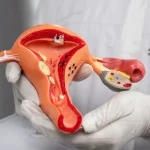
Introduction
Fertility testing is the first step in understanding your reproductive health. Among the most important markers are Anti-Müllerian Hormone (AMH), Follicle-Stimulating Hormone (FSH), and ovarian reserve. These tests help predict how your body may respond to fertility treatments like IVF or IUI.
What Is Ovarian Reserve?
Ovarian reserve refers to the number and quality of eggs remaining in a woman’s ovaries. Every woman is born with a finite number of eggs, and this reserve naturally declines with age.
Anti-Müllerian Hormone (AMH)
AMH is secreted by ovarian follicles and is one of the best indicators of ovarian reserve. Higher AMH suggests more available eggs, while lower levels suggest diminished ovarian reserve. Normal AMH levels vary by age, but generally, values between 1.0–4.0 ng/mL are considered typical.
Follicle-Stimulating Hormone (FSH)
FSH is produced by the pituitary gland and stimulates ovarian follicles to grow. When ovarian reserve is low, FSH levels rise as the body works harder to stimulate the ovaries. FSH is usually measured on Day 3 of the menstrual cycle.
Other Fertility Tests
- Estradiol (E2):** Helps interpret FSH results.
- Antral Follicle Count (AFC):** Ultrasound measure of visible follicles.
- Clomid Challenge Test:** Assesses ovarian function under stimulation.
Why These Tests Matter
Understanding AMH, FSH, and ovarian reserve helps doctors tailor fertility treatments. Women with lower ovarian reserve may need higher doses of medication or consider donor eggs, while those with higher reserve may have more flexibility in protocols.
Patient Story
Emily, age 32, discovered her AMH was lower than expected. With early intervention and tailored IVF protocols, she successfully conceived through Surrogacy4All’s fertility program. She reflects: “Knowing my numbers gave me the clarity to act before it was too late.”
FAQs
Q: Can AMH predict natural conception?
Ans. AMH predicts ovarian reserve, not natural pregnancy chances.
Q: What is a good AMH for IVF?
Ans. Generally, 1.0–4.0 ng/mL suggests adequate reserve, but context matters.
Q: Does low AMH mean no chance of pregnancy?
Ans. No. Women with low AMH can still conceive, sometimes with IVF or donor eggs.
Conclusion
Fertility testing provides a roadmap for treatment. By measuring AMH, FSH, and ovarian reserve, patients and physicians can make informed decisions to maximize success.
Learn more about your options at our Guaranteed Embryos Program:
https://www.surrogacy4all.com/guaranteed-embryos/
Contact – info@surrogacy4all.com | Call – 1-212-661-7177

Rashmi Gulati
Rashmi Gulati, MD, provides innovative, individualized health care that nurtures mind, body, and spirit. Since 2004 she has been the medical director at Patients Medical, where she delivers comprehensive personalized health care, treating each patient as a respected, unique individual. Through their integrative health care center in the heart of Manhattan, Dr. Gulati and her colleagues have become premier care providers serving patients locally and throughout the world.





